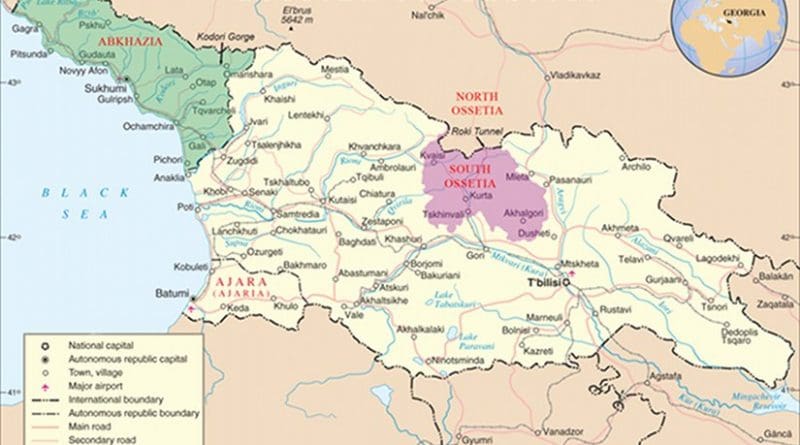The Future Of Georgia-Iran Relations: Context And Opportunities – OpEd
By Joseph Jorjoliani and Jack Myint
Georgia has had longstanding ties with Iran, regardless of both countries’ constantly changing political dynamics.
After the collapse of the Soviet Union, Iran was quick to establish diplomatic ties with its independent neighbors in the South Caucasus and maintained consistent trade and political relations.
Most notably, during the Russo-Georgian war of 2008, Iran condemned Russian military expansion in Georgia and did not recognize the so-called independent states of South Ossetia and Abkhazia despite constant Russian pressure; a move that further solidified ties between Tehran and Tbilisi.
In 2009, Georgia imposed limited sanctions against Iran over controversy surrounding its nuclear program. Subsequently, when Israeli officials alleged that Iran was directly involved in an attempted car bombing at the Israeli embassy in Tbilisi, Georgia terminated its visa-free agreement with Iran in 2013.
The political reality, however, was that Georgia took the aforementioned steps at the behest of western powers on then-Ivanishvili administration, and the two countries continued to maintain political and economic ties. Foreign Direct Investment did not reduce by a substantial proportion, termination of the visa-free agreement remained one-sided, and unlike most other countries, Georgian sanctions against Iran were not full-fledged.
Granted, high level talks and delegation visits between the two countries waned and the tourism industry from Iran to Georgia suffered. But the social, cultural and economic factors kept the relationship intact, due in no small part to the influx of Iranians who migrated to Georgia on Small and Medium Enterprises (SME) visas.
Iran finally entered into a round of talks on non-proliferation of its nuclear program with France, Germany, the United Kingdom, China, Russia and the United States (EU3+3) in 2013 and a preliminary framework was reached in 2015, during which time the Georgia-Iran relationship revamped.
Most recently, Georgia reestablished the visa-free regime for Iranian citizens and Georgian Prime Minister Giorgi Kvirikashvili publicly acknowledged the two countries’ geostrategic interdependence during his official state visit to Iran, the first in over a decade. This signals a bright future ahead for Georgia-Iran relations, which will undoubtedly see benefits to the economic and security interests of both countries and of the region.
Energy security will most likely dominate this alliance. Currently, Georgia is largely dependent on natural gas imports from Azerbaijan, which makes up close to 90% of its energy consumption. The remaining 10% is imported by Gazprom – a Russian “semi-private” oil and gas corporation. Most Georgians share a common concern that any form of dependence on Gazprom will only increase Russian influence in the country, often referring to the Russian electricity and gas blockade of Georgia in 2006. As such, it would be strategic on Georgia’s part to diversify its energy import sources by culminating a strong energy partnership with Iran. That would accomplish the move away from Russian gas and also give Georgia more leverage in future negotiations with Azerbaijan.
From a regional outlook, the E3+3 having reached its implementation stage saw the opening of trade between Iran and the European Union. Putting that in context to energy security, building a new pipeline through Armenia and Georgia to European black sea countries will provide Europe an alternative to Russian gas. This could be a potential upside to the EU as its sole dependence on Russian gas places it in a compromising position. A good example to back this claim would be the Ukraine-Russia gas dispute of 2009, where many EU countries were left without energy for two weeks and could not find alternatives to the Russian market. A quick fix to prevent such a scenario in the future would be to turn to Iran, using Georgia as one of the intermediaries.
The potential of Georgia’s hydropower industry is another sectorial interest that could attract Iranian investment. After meeting with his Georgian counterpart in Tehran, the Energy Minister of Iran, Hamid Chitchian has said, “Iran will set up hydroelectric power plants in Georgia since Iranian companies have the technical know-how in building dams and power plants and Georgia enjoys great capacity in the field of electricity.” The Georgian government, on its part, has long been planning to renovate the country’s electricity grids, facilities, and upgrade equipment. A partnership with Iran would certainly elevate these initiatives and contribute not only to Georgia’s local energy demands but also open up a potential market for electricity export.
Georgia’s recently concluded Free Trade Agreement with the EU is also another noteworthy economic opportunity for Iran and international stakeholders as it places Georgia in a position to be a port of transit for Iranian goods into Europe without the need for additional taxes. Currently, the volume of imports from Iran to Georgia, mainly consisting of agricultural produce and household appliances, amounts to about 92 million dollars, but analysts expect that number to grow exponentially within the next few years.
The future of Georgia-Iran relations is indeed bright and pose numerous opportunities, primarily in trade and regional energy security. At the same time, the relationship is complex in that Georgia has a balancing role to play among its radically charged allies in Iran and Israel. Moving ahead, Tbilisi must remain cautious in not ruffling any feathers as it upgrades its alliances in the Middle East while continuing to work towards its NATO and EU aspirations.
*About the authors:
Joseph Jorjoliani is President of the Georgian Youth Network and former Young Ambassador of Georgia to the United States.
Jack Myint is a Washington, DC based political and business analyst, with a focus on Asia and Eurasia affairs. He is also an honorary fellow for the Georgian Youth Network.

